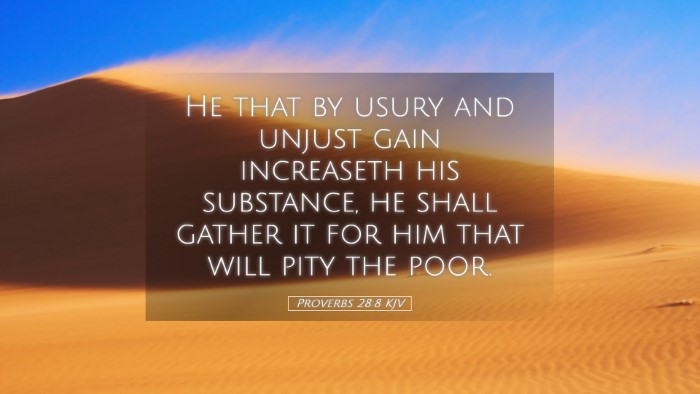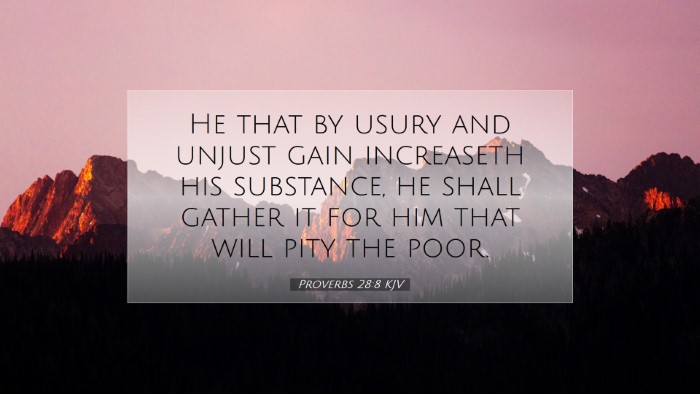Commentary on Proverbs 28:8
Proverbs 28:8 states, "He who increases his wealth by exorbitant interest amasses it for another, who will be kind to the poor." This verse addresses the moral implications of wealth acquisition, emphasizing the consequences of selfish gain versus righteous stewardship.
Introduction
This verse provides a profound insight into the ethical dimension of wealth accumulation. It serves as a stern warning against exploitative financial practices, which were prevalent in ancient times and remain relevant today. Commentators like Matthew Henry, Albert Barnes, and Adam Clarke offer valuable perspectives on the implications of this verse for both individual believers and society as a whole.
Contextual Background
Proverbs, often considered a book of wisdom literature, imparts practical guidance for daily living rooted in obedience to God. The themes of righteousness, justice, and wise stewardship pervade the text, making Proverbs 28:8 a fitting reflection on the societal responsibilities of wealth.
Matthew Henry's Commentary
Matthew Henry observes that this proverb condemns the practice of taking excessive interest or engaging in usurious practices. According to Henry, the verse illustrates a larger principle: the wealth gained through dishonest or immoral means ultimately is transferred to those who will use it for good. He writes:
"He that increases his substance by unlawful gain will find that God will make him a steward, not an owner, of his wealth."
Henry emphasizes that such individuals may be storing up riches which will ultimately benefit the poor, highlighting a divine economic order that opposes greed.
Albert Barnes' Perspective
Albert Barnes takes a slightly different approach, focusing on the fate of those who exploit the poor. He asserts that wealth gained through unfair practices is ill-gotten and will not ultimately benefit the unjust. He elaborates:
"The sinner who accumulates wealth through degradation will ultimately find his fortunes turned against him, as the very resources he hoarded will be handed to those who serve the needs of the community."
Barnes stresses the eventual redistribution of wealth as a God-ordained principle whereby the rich are brought low while the poor are uplifted.
Adam Clarke's Interpretation
Adam Clarke offers a theological lens on this proverb, interpreting it as a call to equitable economic behavior. He emphasizes the moral repercussions of money-lending practices that take advantage of the vulnerable. Clarke remarks:
"The wealth amassed through avarice is not a sign of blessing but a precursor to judgment that redirects it in favor of those in need."
Clarke’s insight reflects a broader theme within biblical literature: true wealth is measured by generosity and justice, not accumulation.
Theological Implications
The overarching theme from these commentaries reveals that the pursuit of wealth, when rooted in greed and exploitation, contributes to societal imbalance. The biblical notion of stewardship invites believers to manage resources responsibly, encouraging prosperity that reflects God's character.
- The Call for Justice: The emphasis on fair treatment underlines a biblical imperative for justice in transactions.
- Divine Provision: The notion that ill-gotten wealth passes to others suggests a providential oversight by God, ensuring that resources ultimately serve His purposes.
- The Role of Wealth in Society: Reflecting on how wealth influences societal dynamics is necessary for pastors and theologians, promoting discussions on ethical financial practices.
Practical Applications
For pastors, students, and theologians, the insights derived from Proverbs 28:8 can foster discussions on the use of wealth and economic ethics within the church and broader communities. Some practical applications include:
- Encouraging Transparency: Promote honest dealings in business ventures among congregants.
- Supporting the Poor: Implement church programs that assist the less fortunate, demonstrating divine principles of provision.
- Encouraging Generosity: Teach the biblical importance of giving and stewardship as a means to counteract greed.
Conclusion
Proverbs 28:8 serves as a timeless admonition against the pitfalls of greed and the exploitation of others for personal gain. Drawing from the insights provided by Matthew Henry, Albert Barnes, and Adam Clarke, we are reminded that wealth must be managed with integrity, and that those who seek to enrich themselves through unjust means will ultimately find their resources turned toward benefitting the poor. This scripture is a clarion call for righteousness, urging those who follow Christ to engage in ethical practices that honor Him and uplift the community.


